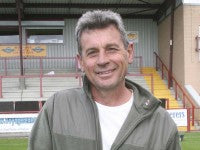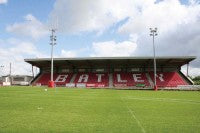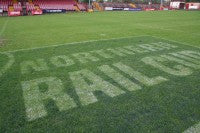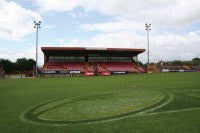Bulldog Spirit
Batley Bulldogs currently play in League One of the Rugby League National Leagues. They are one of the original twenty-two rugby clubs that formed the Northern Rugby Football Union in 1895, making them one of the world's first rugby league teams.

During its lifetime the club has had its fair share of success and failures, including winning the Challenge Trophy three times in the first five years of the tournament being played. But silverware has been hard to come by of late, and only a brief spell in the late 1990s saw any form of success with the club winning the Trans-Pennine Trophy in 1998. When the league was restructured into two divisions in the 1960s, Batley were placed in the second division and they remain one of only a few teams who have never made it into the top flight!
The Mount Pleasant Ground overlooks the West Yorkshire town of Batley. It has undergone major redevelopment over the past ten years with new stands and clubhouse facilities. However, the pitch remains a traditional soil based pitch with one heck of a slope on it! From one end to the other it rises a staggering 3.6 metres! There is no drainage installed. Water generally drains away quickly thanks to 150mm depth of topsoil on top of a sandstone layer. However, the topsoil is, typically, a heavy loam soil which, when compacted, can cause problems.
Maintenance is undertaken by Jim Morley a local groundsman and landscape gardener who, for the past seven years, has been contracted to work eight hours a week at the ground.
The pitch is cut using a 30" Ransomes Mastiff mower, always-double cutting for matches. During the growing season Jim will cut the pitch four times a week maintaining a height of cut of 32mm. Mowing alone takes close to six hours a week and, with marking out taking a further two hours, his contracted time is soon used up.

Consequently, Jim spends at least twice his contracted hours at the ground on a voluntary basis, sometimes up to twenty hours a week, ensuring that the pitch is in a good condition.
Marking out is carried using a transfer wheel line marker and Grassline paint. Weeds are spot treated, mainly to control plantains and dandelions. After matches the pitch is divoted and then brushed using a Sisis 5ft sweeper brush.
Jim often has to beg, steal or borrow equipment. The pitch easily gets compacted after play, especially during wet periods, when the soil is wet and saturated. To help relieve the compaction the pitch is regularly aerated, alternating between Sisis slit tining and chain harrowing on a weekly rotation.
Even though the club allocate a small annual budget for general maintenance, Jim still has to go 'cap in hand' to secure funds for end of season renovations and any other unforeseen works. In an ideal world he likes to scarify, deep aerate, topdress and overseed.
However, in 2008, the club made no funds available for end of season renovations leaving Jim somewhat concerned, especially when he knows that, like most clubs, a considerable amount of money is spent on players' wages. Whilst he accepts that money will always be tight at clubs like the Batley Bulldogs he does find the whole scenario frustrating.

With no money available, Jim's only 'renovation' was an application of autumn fertiliser and continuation of his maintenance regimes.
The playing season runs from February through to late August, with the pitch having to cope with two games a week plus training sessions. However, any end of season renovations cannot start until all the corporate games and schoolboy finals have been completed. During this period the pitch often has to cope with four fixtures a day, not what is required at the end of a busy season.
However, the pitch does recover well from this beating thanks, in the main, to Jim's diligence. His worst period is the summer months when the grass is growing well. With no watering facilities at the ground he has to rely purely on rainfall to keep the pitch watered, something Yorkshire has not been short of in the past two summers. Even then, with the pitches free draining construction, it soon dries out and the grass can easily become stressed.
Jim, like many groun dsmen, is proud of his pitch. The long hours he puts in 'beyond the call of duty' to maintain his hallowed turf is not untypical. He doesn't want paying any more for his time. He would just like the appropriate funds to buy the essential materials and products to continue to improve the playing surface.
dsmen, is proud of his pitch. The long hours he puts in 'beyond the call of duty' to maintain his hallowed turf is not untypical. He doesn't want paying any more for his time. He would just like the appropriate funds to buy the essential materials and products to continue to improve the playing surface.
There is no question that players like to perform on a quality playing surface, and that the condition of the pitch can dictate the performance of a team.
Jim, like everyone else at the club, wants to see Batley Bulldogs succeed, and to improve their status in rugby league. But, it goes with out saying that, without a decent facility to train and play on, how can the club expect to attract new players?
I am sure Jim will one day get his just rewards. As ever it will be about priorities. At present the pitch comes lower in the pecking order. Maybe one day the club will provide the necessary funding to allow Jim the opportunity to produce a pitch the players and the club deserve.
And I have no doubt that Jim will keep trying to convince the club to spend money on the pitch!
